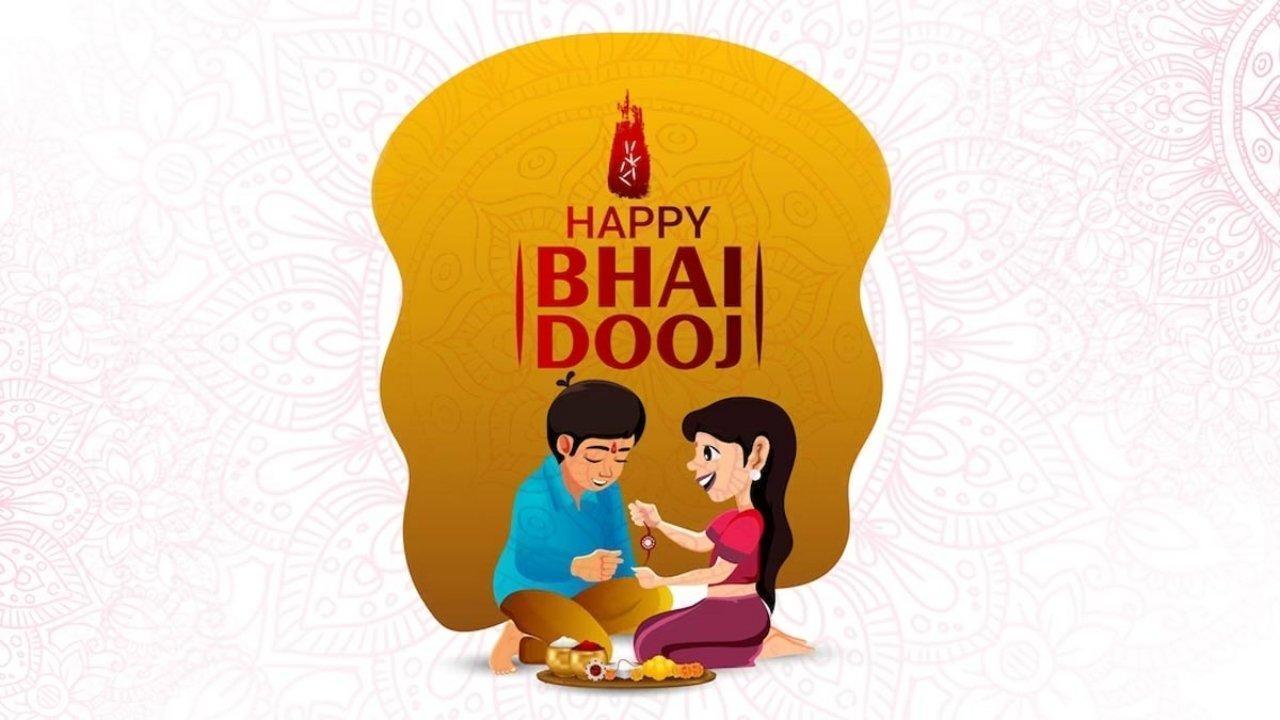You have not yet added any article to your bookmarks!

Join 10k+ people to get notified about new posts, news and tips.
Do not worry we don't spam!

Post by : Anis Farhan
Among the many vibrant celebrations that light up India’s festive calendar, Bhai Dooj holds a unique emotional charm. It is not merely a festival but a heartwarming expression of love, trust, and lifelong bonding between brothers and sisters. Marking the conclusion of Diwali festivities, Bhai Dooj signifies the essence of siblinghood — where sisters pray for their brothers’ prosperity, and brothers promise to protect their sisters forever.
Falling on the second lunar day (Dwitiya) of the Shukla Paksha in the month of Kartika, this festival holds immense cultural significance across India and even beyond. While the names and customs differ from region to region, the sentiment remains universal — celebrating the sacred relationship that transcends distance, age, and time.
Like most Indian festivals, Bhai Dooj too has its roots deep in mythology. One of the most popular legends associated with it traces back to Lord Krishna and his sister Subhadra. After Krishna defeated the demon Narakasura, he returned to Dwarka where Subhadra warmly welcomed him with sweets, tilak, and aarti — praying for his long life and well-being. This affectionate gesture laid the foundation for what we today know as Bhai Dooj.
Another tale speaks of the god of death, Yama, visiting his sister Yami (Yamuna) on this auspicious day. Yami performed aarti for her brother, applied a sacred tilak on his forehead, and served him a grand feast. Deeply touched, Yama declared that any brother who receives a tilak and blessings from his sister on this day would never be led to the gates of hell. From then on, this day came to be known as Yama Dwitiya, another name for Bhai Dooj.
These ancient legends reveal the timeless message of sibling affection — that love, when pure and unconditional, protects and uplifts the soul itself.
The celebration of Bhai Dooj begins with sisters preparing their homes for the ritual. Early in the morning, they perform a bath of purification and decorate the puja thali with roli (vermilion), rice, sweets, coconut, betel nuts, and a diya. Brothers, dressed in traditional attire, visit their sisters’ homes to participate in the ceremony.
The main ritual involves the sister applying a red tilak on her brother’s forehead, performing aarti, and offering sweets while praying for his long life and happiness. In return, the brother gifts her money, clothes, jewelry, or any token of love, promising to protect her against all odds.
Families then gather for a hearty festive meal, which often includes traditional sweets like barfi, ladoo, and peda. In some regions, special dishes such as basundi poori or karanji are prepared to mark the occasion.
In modern times, when many siblings live apart due to work or studies, the festival still thrives through digital celebrations. Video calls, couriered gifts, and heartfelt messages bridge the physical distance, ensuring that the emotional connection remains unbroken.
India’s cultural diversity ensures that Bhai Dooj is celebrated in numerous vibrant ways across different states, each with its distinct name and customs.
In Bengal, it is known as Bhai Phonta, where sisters observe a fast until they apply a sandalwood tilak to their brothers’ foreheads. A lavish feast follows, filled with traditional Bengali delicacies.
In Maharashtra and Goa, the festival is called Bhau Beej. Sisters invite their brothers to their homes and perform the rituals, often preparing basundi poori as a special treat.
In Uttar Pradesh and Bihar, sisters place a dry coconut along with the tilak ritual, symbolizing strength and endurance in their brother’s life.
In Nepal, it is celebrated as Bhai Tika during the Tihar festival, where sisters adorn their brothers with a multi-colored tilak called Saptarangi Tika. The vibrant ceremony represents a colorful expression of love and togetherness.
Despite these variations, the underlying message remains consistent — a celebration of trust, loyalty, and affection that unites families across geographies.
Beyond its religious and traditional framework, Bhai Dooj stands as an emotional pillar in Indian culture. It reinforces family values in an age where relationships are often tested by time and distance. The festival reminds every brother and sister of the selfless bond they share — one that begins in childhood and continues throughout life.
For sisters, it’s a day of heartfelt prayers and gratitude — a symbolic act of wishing their brothers safety, prosperity, and fulfillment. For brothers, it’s an opportunity to reflect on their role as a protector and well-wisher. The rituals may last a few hours, but the emotions linger long after the festival ends.
Bhai Dooj also transcends gender norms in its essence. In recent years, even sisters without brothers or brothers without sisters celebrate the day by performing the rituals with cousins, friends, or chosen siblings — reflecting the inclusive spirit of modern Indian festivals.
Bhai Dooj forms the fifth and final day of Diwali celebrations. Each day of Diwali carries its unique importance — from Dhanteras to Naraka Chaturdashi, Lakshmi Puja, Govardhan Puja, and finally Bhai Dooj.
Symbolically, Diwali marks the triumph of light over darkness, and Bhai Dooj extends that symbolism into the realm of human relationships. It brings emotional closure to the festive season by emphasizing personal bonds and harmony within families. Just as Diwali lights up homes, Bhai Dooj lights up hearts with love and gratitude.
In today’s fast-paced world, the way Bhai Dooj is celebrated has evolved significantly. For families separated by distance, technology plays a pivotal role. Video calls, digital e-cards, and online gifting platforms have become integral to the festival.
However, even amid modernization, many families ensure that traditional values remain intact. The joy of preparing a thali, the warmth of the aarti flame, and the aroma of home-cooked sweets still define the festival’s soul.
Urban India, in particular, has seen creative adaptations — from office celebrations recognizing sibling-like bonds among colleagues, to NGOs organizing “Bhai Dooj for All” events for orphaned children, ensuring that the joy of togetherness reaches every heart.
Beyond its emotional and familial significance, Bhai Dooj plays an important role in preserving India’s cultural fabric. It nurtures the value of respect, unity, and empathy among family members. The festival’s inclusive nature — open to all communities — makes it a universal celebration of affection and human connection.
Economically too, Bhai Dooj contributes to festive spending. Markets bustle with shoppers buying gifts, sweets, and ethnic wear. Local artisans, sweet-makers, and small businesses witness a surge in sales, symbolizing how traditional festivals continue to support modern economies.
Moreover, in urban societies where nuclear families dominate, Bhai Dooj acts as a bridge to reconnect extended families, strengthening inter-generational relationships and reinforcing shared values.
Indian diaspora communities across the globe celebrate Bhai Dooj with equal enthusiasm. From the streets of London to Singapore, New York to Kuala Lumpur, Indian families organize get-togethers, virtual ceremonies, and community feasts.
These global celebrations showcase the power of Indian traditions to transcend borders. They remind everyone that the bond between siblings — filled with love, laughter, and a touch of mischief — is truly universal. Whether performed in a small Indian village or a bustling foreign city, the emotions remain the same.
In an age dominated by digital distractions and busy lifestyles, Bhai Dooj serves as a timely reminder to pause and reconnect with loved ones. The festival’s message is timeless — that love and care within families are what truly sustain us.
While modern celebrations may not always follow ancient customs to the letter, the essence of Bhai Dooj remains unchanged: expressing gratitude, celebrating relationships, and cherishing emotional bonds that go beyond material gifts.
As India continues to evolve, Bhai Dooj stands as a comforting constant — a gentle reaffirmation that family love, trust, and emotional connection are still the greatest blessings one can have.
This article is a cultural feature written to highlight the traditions, significance, and evolving celebrations of Bhai Dooj across India and the world. It aims to provide general information and does not represent any religious or regional bias.










Top Sci-Fi Movies Streaming on Netflix This February: Must-Watch Picks for Genre Fans
A curated news-style guide to the best science fiction films currently available on Netflix in Febru

BCCI Central Contracts Shake-Up: Kohli, Rohit Moved to Grade B as Board Reshapes 2025–26 List
Virat Kohli and Rohit Sharma have been placed in Grade B in the BCCI’s 2025–26 central contract list

Dalal Street Spotlight: Top 10 Stocks Investors Are Watching as Markets Open on a High
Indian stock markets begin the week with strong momentum, and several blue-chip and mid-cap stocks a

Market Movers Today: Key Stocks Set To Watch In Indian Markets
Indian equity markets are poised for active trading as several major companies, including Bharti Air

Milan Welcomes the World: Inside the Grand Opening Ceremony of the 2026 Winter Olympics
The 2026 Winter Olympics opening ceremony in Milan marked a defining moment for global sport, blendi

Unfolding Market Drama: Sensex & Nifty Trade Volatility Amid Budget Fallout and India-US Trade Breakthrough
Indian equity markets exhibited high volatility this week as the 2026 Union Budget triggered sharp s